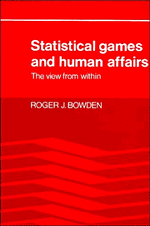Book contents
- Frontmatter
- Contents
- Preface
- 1 The reactive sample space
- 2 Response and social information
- 3 Response and strategic behavior
- 4 Publication and the political economy of prediction
- 5 Rational expectations and socioeconomic modeling
- 6 Games, beauty contests, and equilibrium: the foundations of structural invariance
- 7 Disequilibrium and noncooperative expectational games
- 8 The view from within
- References
- Index
5 - Rational expectations and socioeconomic modeling
Published online by Cambridge University Press: 05 February 2012
- Frontmatter
- Contents
- Preface
- 1 The reactive sample space
- 2 Response and social information
- 3 Response and strategic behavior
- 4 Publication and the political economy of prediction
- 5 Rational expectations and socioeconomic modeling
- 6 Games, beauty contests, and equilibrium: the foundations of structural invariance
- 7 Disequilibrium and noncooperative expectational games
- 8 The view from within
- References
- Index
Summary
Introduction
In this and the next chapter, we shall study different aspects of rational-expectations equilibria, a notion that lies at the heart of invariance phenomena in socioeconomic systems. The basic idea originated in economics with the work of Muth (1961) and is concerned with the way in which individuals form their expectations or predictions of future variables. One of the drawbacks of the several popular expectational schemes used in empirical work at the time was that predictions formed by using such schemes were in general biased. Muth was actually concerned to show that under certain circumstances one such scheme, namely, the adaptive expectations scheme, could result in unbiased forecasts if the parameter of this scheme was correctly chosen. Later authors, however, seized on and developed the methodology of Muth's paper, dispensing altogether with adaptive or other simple expectational schemes. Such methods could be used to develop forecasting formulas that were inherently model based and unbiased. In this way, an awkward and unappealing implication of the mechanistic schemes could be avoided: For if such schemes were recognized to be biased, it would surely pay individuals to improve things or even to take private advantage of the bias and in doing so change the way in which in the aggregate expectations were formed.
We should be a little clearer about the invariance aspect of such equilibria. Individuals are assumed to form subjective probability distributions of future variables and to formulate decisions based upn those distributions.
- Type
- Chapter
- Information
- Statistical Games and Human AffairsThis View from Within, pp. 135 - 186Publisher: Cambridge University PressPrint publication year: 1989



